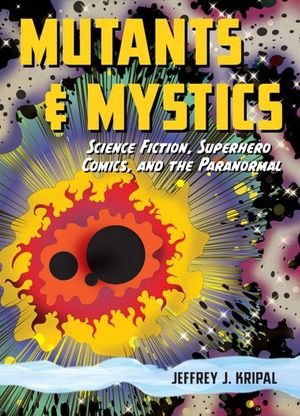Mutants & Mystics
An “intriguing” study of how comic books explore paranormal experiences (Times Literary Supplement).
“This book is an excellent guide, maybe even a new map of mysterious terrain first charted in antiquity. Always scholarly yet never stuffy, always fun but never superficial.” —Doug Moench, author of Batman and The Big Book of the Unexplained
In many ways, twentieth-century America was the land of superheroes and science fiction. From Superman and Batman to the Fantastic Four and the X-Men, these pop-culture juggernauts, with their “powers and abilities far beyond those of mortal men,” thrilled readers and audiences—and simultaneously embodied a host of our dreams and fears about modern life and the onrushing future.
But that’s just scratching the surface, says Jeffrey Kripal. In Mutants & Mystics, Kripal offers a brilliantly insightful account of how comic book heroes have helped their creators and fans alike explore and express a wealth of paranormal experiences ignored by mainstream science. Delving deeply into the work of major figures in the field—from Jack Kirby’s cosmic superhero sagas and Philip K. Dick’s futuristic head-trips to Alan Moore’s sex magic and Whitley Strieber’s communion with visitors—Kripal shows how creators turned to science fiction to convey the reality of the inexplicable and the paranormal they experienced in their lives. Expanded consciousness found its language in the metaphors of sci-fi—incredible powers, unprecedented mutations, time-loops and vast intergalactic intelligences—and the deeper influences of mythology and religion that these in turn drew from; the wildly creative work that followed caught the imaginations of millions. Moving deftly from Cold War science and Fredric Wertham’s anticomics crusade to gnostic revelation and alien abduction, Kripal spins out a hidden history of American culture, rich with mythical themes and shot through with an awareness that there are other realities far beyond our everyday understanding.
A bravura performance, beautifully illustrated in full color throughout and brimming over with incredible personal stories, Mutants & Mystics is that rarest of things: a book that is guaranteed to broaden—and maybe even blow—your mind.
“[Kripal] bridges the gap between spirituality and its sometimes seedy outcroppings in pop culture, and forges—or rather, reveals—a synthesis that was really there all along, if so many guys with PhD’s hadn’t had a vested interest in not recognizing it. More power to him, I say! Or rather—more super-power!” —Roy Thomas, writer of The Uncanny X-Men, Fantastic Four, The Incredible Hulk, and more
BUY NOW FROM
COMMUNITY REVIEWS

